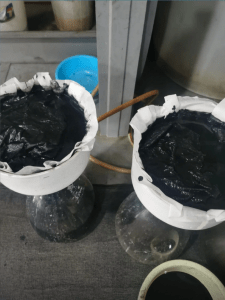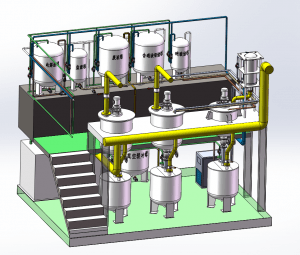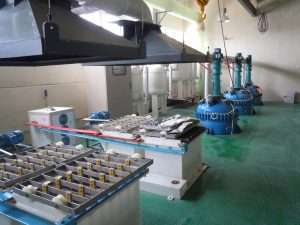Call us now:
Ruthenium is a rare metal that is usually purified by electrolytic refining methods. The following are the basic steps of ruthenium refining:
First, the raw material containing ruthenium is melted together with other metallic impurities to obtain a mixed alloy.
Next, this alloy is placed in an electrolytic bath in which the electrolyte is potassium fluoride.
In the electrolyzer, the ruthenium and other metals are decomposed into anode sludge and cathode sludge.
By controlling the potential and current in the electrolyte, the ruthenium can be deposited on the cathode, thus purifying it.
Finally, the cathode sludge is collected and processed to obtain high purity ruthenium.
The equipment required includes an electrolyzer, power supply, electrolyte, cathode and anode. In practice, parameters such as temperature, potential and current also need to be controlled to ensure that the ruthenium is refined.
Please note that ruthenium refining is a specialized technical activity that requires relevant expertise and practical experience. Before refining ruthenium, please ensure that you are aware of and comply with the relevant safety regulations and operating procedures.
Some additional information on ruthenium refining:
The electrolytic refining of ruthenium is usually carried out at high temperatures and pressures and therefore the equipment costs are high. The material of the electrolytic bath needs to have good corrosion resistance and be able to withstand high temperatures and pressures.
The electrolyte is a potassium fluoride solution, which requires special operating conditions such as storage and use at high temperatures, low pressures and dry conditions. At the same time, potassium fluoride solutions are toxic and corrosive and require strict control of the operating environment and personnel protection measures.
In the ruthenium refining process, strict control of potential and current is required to ensure the efficiency and purity of the ruthenium deposition. This requires special power and control systems and the relevant technical expertise to operate and monitor them.
Ruthenium is an important rare metal with a wide range of applications in electronics, chemicals, aerospace and other fields. Due to the scarcity of ruthenium resources, the research and development of efficient refining and recovery technologies for ruthenium is of great importance.
In conclusion, ruthenium refining is a complex technical process that requires special equipment, electrolytes and operating conditions, and requires specialized technicians to operate and monitor it. The research and development of ruthenium refining and recovery technologies are of great importance for improving the efficiency of ruthenium resources utilization and protecting the environment.


